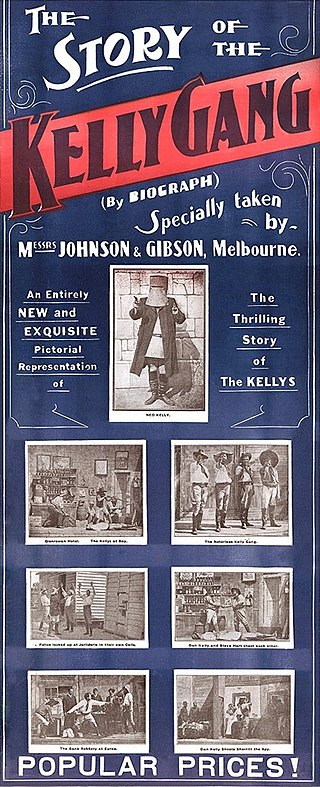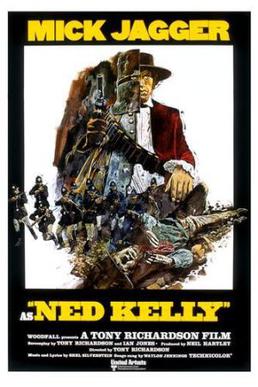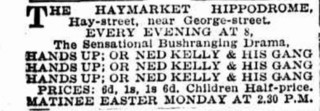Related Research Articles

Bushrangers were armed robbers and outlaws who resided in the Australian bush between the 1780s and the early 20th century. The original use of the term dates back to the early years of the British colonisation of Australia, and applied to transported convicts who had escaped into the bush to hide from the authorities. By the 1820s, the term had evolved to refer to those who took up "robbery under arms" as a way of life, using the bush as their base.

The Story of the Kelly Gang is a 1906 Australian bushranger film directed by Charles Tait. It traces the exploits of the 19th-century Kelly gang of bushrangers and outlaws, led by Ned Kelly. The silent film was shot in and around Melbourne and originally ran for more than an hour with a reel length of about 1,200 metres (4,000 ft), making it the longest narrative film yet seen in the world.

Edward Kelly was an Australian bushranger, outlaw, gang leader and convicted police-murderer. One of the last bushrangers, he is known for wearing a suit of bulletproof armour during his final shootout with the police.

Ned Kelly is a 1970 British-Australian biographical bushranger film. It was the seventh Australian feature film version of the story of 19th-century Australian bushranger Ned Kelly, and is notable for being the first Kelly film to be shot in colour.

Joseph Byrne was an Australian bushranger, outlaw and member of the Kelly gang, referred to as leader Ned Kelly's second in command.

Glenrowan is a town located in the Wangaratta local government area of Victoria, Australia. It is 236 kilometres north-east of Melbourne and 14 kilometres from Wangaratta and near the Warby Ranges and Mount Glenrowan. At the 2021 census, Glenrowan had a population of 1,049.

Daniel Kelly was an Australian bushranger and outlaw. The son of an Irish convict, he was the younger brother of the bushranger Ned Kelly. In 1878, Dan and Ned killed three policemen at Stringybark Creek in northeast Victoria, near the present-day town of Tolmie, Victoria. With two friends, Joe Byrne and Steve Hart, the brothers formed the Kelly Gang, which robbed banks, took over whole towns, and terrorized the people of Victoria and New South Wales for two years. The Victorian police searched for them, locked up their friends and families, but could not find them. Dan Kelly died during the infamous siege of Glenrowan in June 1880.

Stephen Hart was an Australian bushranger, a member of the Kelly Gang.
The Glenrowan Affair is a 1951 movie about Ned Kelly from director Rupert Kathner. It was Kathner's final film and stars VFL star Bob Chitty as Kelly. It is considered one of the worst films ever made in Australia.
When the Kellys Rode is a 1934 Australian film directed by Harry Southwell about Ned Kelly.
When the Kellys Were Out is a 1923 Australian feature-length film directed by Harry Southwell about Ned Kelly. Only part of the film survives today.

Ned Kelly was a 19th-century Australian bushranger and outlaw whose life has inspired numerous works in the arts and popular culture, especially in his home country, where he is viewed by some as a Robin Hood-like figure.
The bushranger ban was a ban on films about bushrangers that came into effect in parts of Australia in 1911–12. Films about bushrangers had been the most popular genre of local films ever since The Story of the Kelly Gang (1906). Governments were worried about the influence this would have on the population and bans against films depicting bushrangers were introduced in South Australia (1911), New South Wales and Victoria (1912).
The Kelly Gang; or the Career of the Outlaw, Ned Kelly, the Iron-clad Bushranger of Australia is an 1899 Australian play about bushranger Ned Kelly. It is attributed to Arnold Denham but it is likely a number of other writers worked on it.
Treason is a 1959 Australian television live drama, which aired on ABC about the 20 July plot during World War Two. Originally broadcast 16 December 1959 in Melbourne, a kinescope ("telerecording") was made of the program and shown in Sydney on 13 January 1960. It was an adaptation of a stage play by Welsh writer Saunders Lewis, which had previously been adapted as an episode of BBC Sunday-Night Theatre.

Ballad for One Gun is a 1963 Australian television film about Ned Kelly broadcast on ABC.
Macbeth is a 1960 Australian TV film based on the play by William Shakespeare. It was directed by William Sterling.
The Last Outlaw is a 1963 British radio serial by Rex Rienits about Ned Kelly. It is not to be confused with the 1980 Australian mini series about Kelly, which has the same name.
The Last Outlaw is a 1963 British radio serial by Rex Rienits about Ned Kelly. It is not to be confused with the 1980 Australian mini series about Kelly, which has the same name.

Hands Up, or Ned Kelly and His Gang is a 1900 Australian play by Edward Irham Cole about Ned Kelly.
References
- ↑ "Ned Kelly Story". Sydney Morning Herald . 25 January 1960. p. 12.
- ↑ Vagg, Stephen (February 18, 2019). "60 Australian TV Plays of the 1950s & '60s". Filmink .
- ↑ "Inspired by Bushranger". The Age . 12 March 1959. p. 26.
- ↑ "Glenrowan Setting for Ned Kelly". The Age . 23 July 1959. p. 13.
- 1 2 "Glenrowan Sets for Ned Kelly TV Verse Play". The Age. 13 August 1959. p. 13.
- ↑ "Film Backgrounds of Glenrowan for TV Kelly Drama". The Age . 3 September 1959. p. 14.
- ↑ "'Mocked Up' for Scene in Kelly Play". The Age . 3 September 1959. p. 15.
- ↑ "TV Shooting Ned Kelly". The Age. 15 October 1959. p. 14.
- ↑ ""Retreat" from Glenrowan". The Age . 20 August 1959. p. 26.
- ↑ "TV Guide". The Age . p. 35.
- ↑ "'Mocked Up' for Scene in Kelly Play". The Age. 3 September 1959. p. 29.
- ↑ "Ned Kelly Produced on ABN 2". Sydney Morning Herald . 27 January 1960. p. 11.
- ↑ Janus (29 October 1959). "Ned Kelly Fails to Pass Western Test". The Age . p. 13.
- ↑ "Aust Approach to Drama". The Age . 5 November 1959. p. 14.
